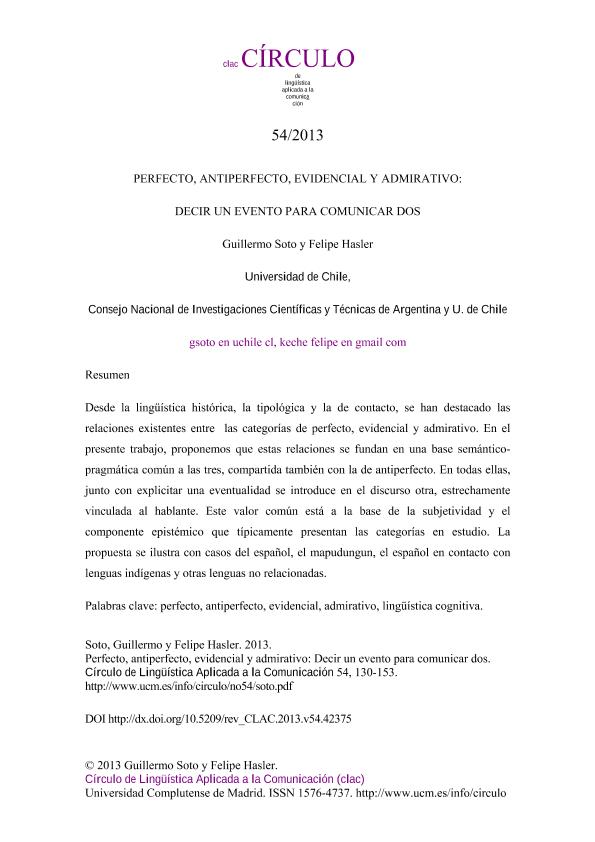Artículo
Desde la lingüística histórica, la tipológica y la de contacto, se han destacado las relaciones existentes entre las categorías de perfecto, evidencial y admirativo. En el presente trabajo, proponemos que estas relaciones se fundan en una base semánticopragmática común a las tres, compartida también con la de antiperfecto. En todas ellas, junto con explicitar una eventualidad se introduce en el discurso otra, estrechamente vinculada al hablante. Este valor común está a la base de la subjetividad y el componente epistémico que típicamente presentan las categorías en estudio. La propuesta se ilustra con casos del español, el mapudungun, el español en contacto con lenguas indígenas y otras lenguas no relacionadas. Perfect, antiperfect, evidential and mirative: Saying one event to communicate two. Historical, typological, and contact linguistics have recognized the relationships among the categories of perfect, evidential and mirative. In this work, we propose that such relationships stem from a semantic-pragmatic ground common to those categories and the category of antiperfect. All of them designate one eventuality explicitly, but also introduce another speaker-related eventuality implicitly in the ongoing discourse. This basic meaning grounds the subjective and epistemic meanings tipically associated with the categories. Our proposal is illustrated with examples form Spanish, Mapudungun, Spanish in contact with American languages, and other languages.
Perfecto, Antiperfecto, Evidencial y Admirativo: Decir un evento para comunicar dos
Título:
Perfect, antiperfect, evidential and mirative: Saying one event to communicate two
Fecha de publicación:
05/2013
Editorial:
Universidad Complutense de Madrid
Revista:
Circulo de Lingüística Aplicada a la Comunicacion
ISSN:
1576-4737
Idioma:
Español
Tipo de recurso:
Artículo publicado
Clasificación temática:
Resumen
Palabras clave:
Perfecto
,
Antiperfecto
,
Evidencial
,
Lingüística Cognitiva
Archivos asociados
Licencia
Identificadores
Colecciones
Articulos(CAICYT)
Articulos de CENTRO ARGENTINO INFORM. CIENTIF. Y TECNOLOGICA
Articulos de CENTRO ARGENTINO INFORM. CIENTIF. Y TECNOLOGICA
Citación
Soto, Guillermo Daniel; Hasler Sandoval, Felipe Daniel; Perfecto, Antiperfecto, Evidencial y Admirativo: Decir un evento para comunicar dos; Universidad Complutense de Madrid; Circulo de Lingüística Aplicada a la Comunicacion; 54; 5-2013; 130-153
Compartir
Altmétricas




